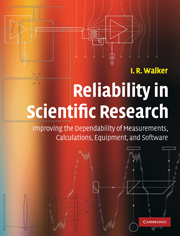 Reliability in Scientific Research
Reliability in Scientific Research Published online by Cambridge University Press: 05 June 2012
Introduction
Generally, nearly all of the equipment, devices, substances, and software that are employed in scientific research are of commercial origin. It is clear from everyday experience that the reliability and usability of such products can range from superb to abysmal. (Usability has an impact on overall reliability through its effect on human error.) Low-quality items, coupled with poor documentation (e.g. operating instructions), and lack of after-sales technical support from the companies that made them, can have a very harmful effect on laboratory productivity. The purpose of this chapter is to provide ways of avoiding such problems.
Using established technology and designs
As was pointed out in a general context on page 4, if reliability is important, one should not normally employ devices or software that use a technology which has not previously been in commercial production. Most innovative things have unforeseen problems (sometimes in very significant numbers), which can be found and dealt with only after such things have been tested by many users over an extended period. This is a particularly serious issue with computer software (see page 504).
To save this book to your Kindle, first ensure [email protected] is added to your Approved Personal Document E-mail List under your Personal Document Settings on the Manage Your Content and Devices page of your Amazon account. Then enter the ‘name’ part of your Kindle email address below. Find out more about saving to your Kindle.
Note you can select to save to either the @free.kindle.com or @kindle.com variations. ‘@free.kindle.com’ emails are free but can only be saved to your device when it is connected to wi-fi. ‘@kindle.com’ emails can be delivered even when you are not connected to wi-fi, but note that service fees apply.
Find out more about the Kindle Personal Document Service.
To save content items to your account, please confirm that you agree to abide by our usage policies. If this is the first time you use this feature, you will be asked to authorise Cambridge Core to connect with your account. Find out more about saving content to Dropbox.
To save content items to your account, please confirm that you agree to abide by our usage policies. If this is the first time you use this feature, you will be asked to authorise Cambridge Core to connect with your account. Find out more about saving content to Google Drive.